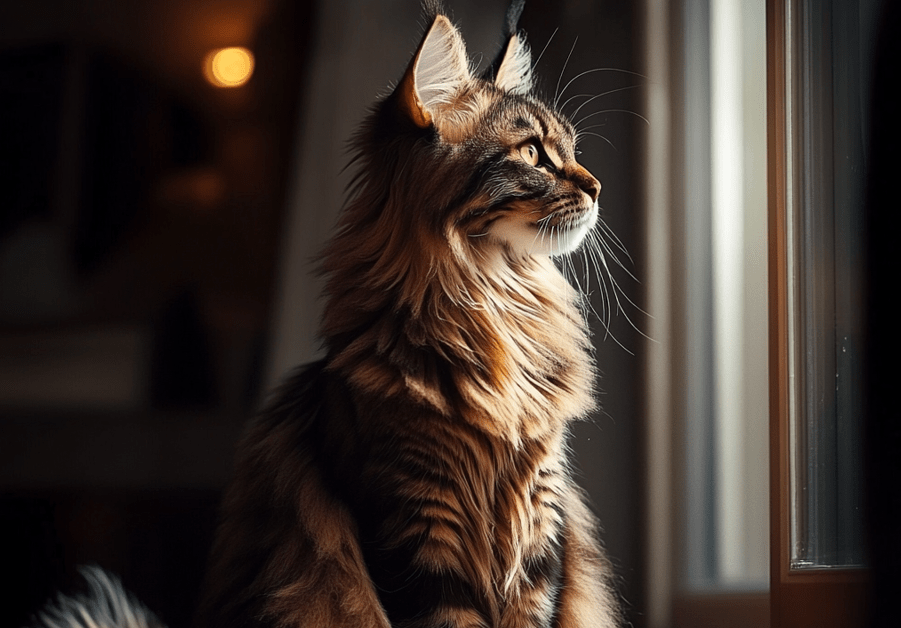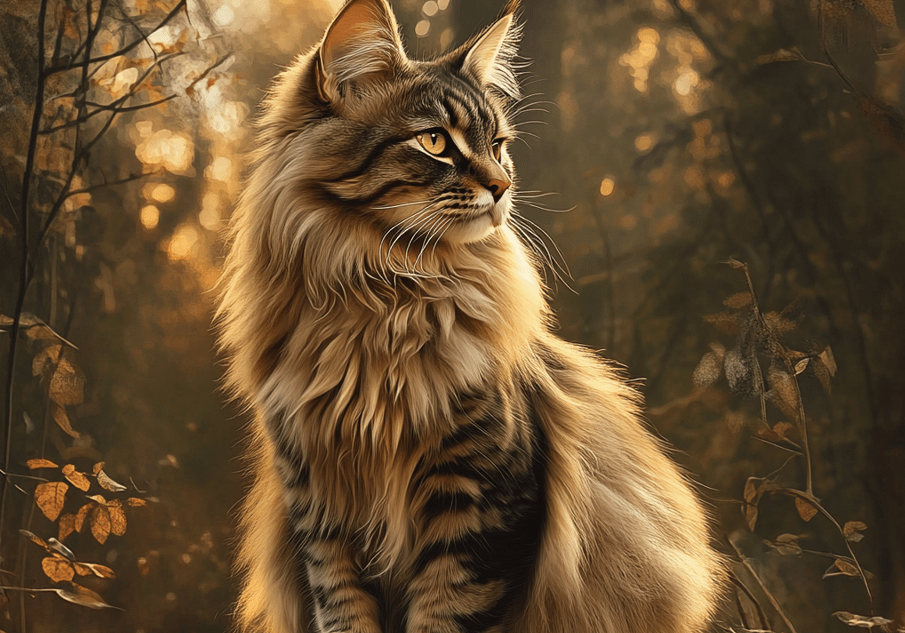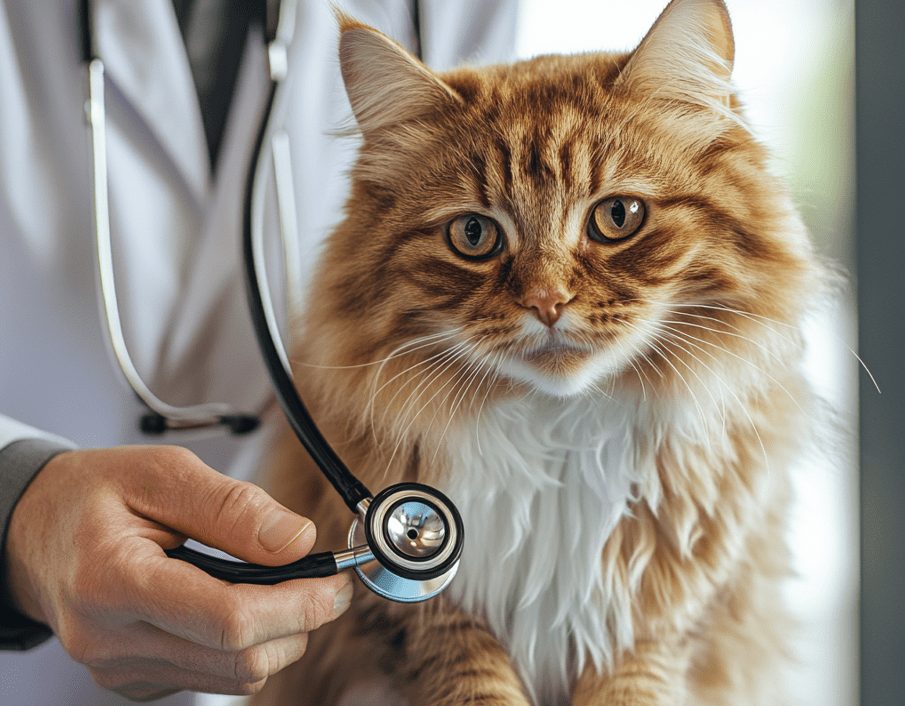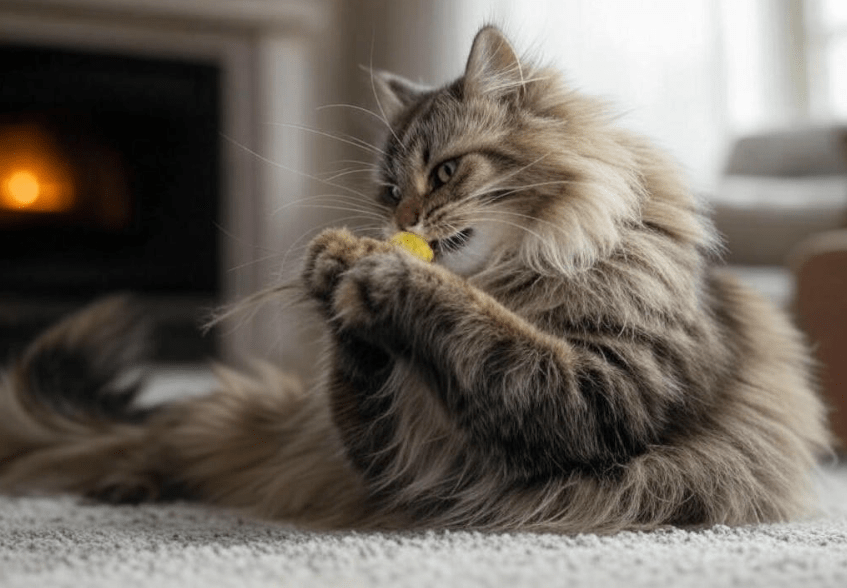
Maine Coons, with their majestic size, tufted ears, and friendly personalities, are beloved for their dog-like loyalty and intelligence. However, like all cats, they can experience stress, which can affect their health and behavior. Understanding Maine Coon stress is crucial for ensuring your feline friend lives a happy, balanced life. This comprehensive guide explores the signs of stress in Maine Coons, its causes, and practical ways to calm your cat. By recognizing symptoms early and implementing effective strategies, you can help your Maine Coon thrive in a stress-free environment.
Why Maine Coons Are Prone to Stress
Maine Coons are sensitive creatures despite their large, robust appearance. Their social nature and intelligence make them particularly attuned to their surroundings, which can sometimes lead to stress. Here’s why Maine Coons may be susceptible:
Social Sensitivity: Maine Coons form strong bonds with their owners and may become stressed by changes in attention or household dynamics.
Environmental Sensitivity: Their curiosity makes them aware of disruptions like loud noises or new furniture.
Health Predispositions: Maine Coons are prone to certain health issues, such as hip dysplasia or heart conditions, which can contribute to discomfort and stress.
Need for Stimulation: Without adequate mental and physical activity, their active minds can lead to boredom-induced stress.
Understanding these factors helps you identify and address stress triggers effectively.
Recognizing Signs of Maine Coon Stress
To manage Maine Coon stress, you must first recognize its signs. Stress manifests in physical, behavioral, and emotional ways. Below are common indicators to watch for:
Physical Signs
Changes in Appetite: Eating too much or too little can signal stress.
Over-Grooming or Hair Loss: Excessive licking, leading to bald patches, is a common stress response.
Digestive Issues: Vomiting, diarrhea, or constipation may indicate stress-related discomfort.
Lethargy: A normally active Maine Coon becoming withdrawn or overly tired could be stressed.
Frequent Illness: Stress weakens the immune system, making your cat more susceptible to infections.
Behavioral Signs
Hiding or Avoidance: Spending more time under furniture or avoiding interaction is a red flag.
Aggression: Sudden irritability, hissing, or swatting may indicate stress.
Litter Box Issues: Urinating or defecating outside the litter box can be a stress response.
Excessive Vocalization: Maine Coons are vocal, but increased meowing or yowling may signal distress.
Destructive Behavior: Scratching furniture or chewing objects excessively can reflect anxiety.
Emotional Signs
Clinginess: Seeking constant attention or following you more than usual.
Restlessness: Pacing or inability to settle down may indicate unease.
Fearful Reactions: Flinching at normal sounds or movements suggests heightened anxiety.
Monitoring your Maine Coon’s normal behavior is key to spotting these changes early.
Common Causes of Stress in Maine Coons
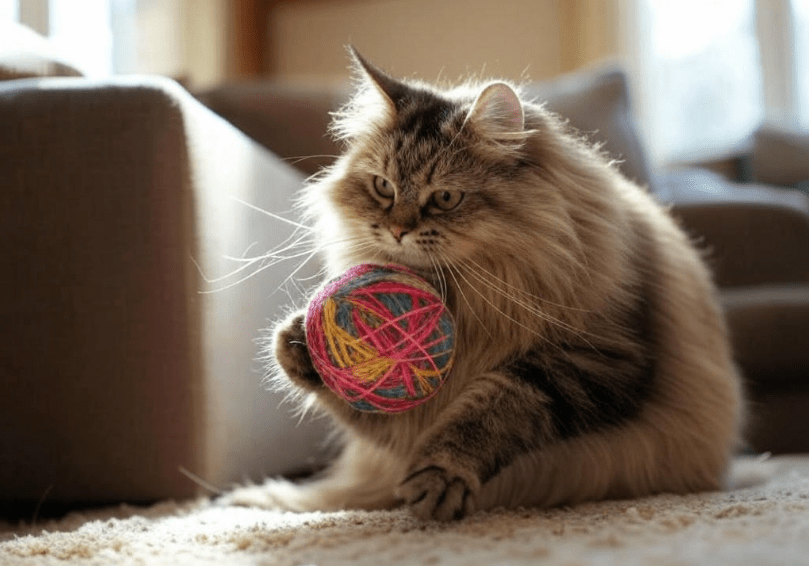
Identifying the root cause of Maine Coon stress is essential for addressing it. Here are common triggers:
Environmental Changes: Moving to a new home, rearranging furniture, or introducing new pets can unsettle your cat.
Routine Disruptions: Changes in feeding schedules, owner absence, or travel can cause anxiety.
Lack of Stimulation: Insufficient playtime or enrichment can lead to boredom and stress.
Social Conflicts: Tension with other pets or lack of attention from owners can be stressful.
Health Issues: Pain from conditions like arthritis or dental problems can manifest as stress.
Loud Noises: Fireworks, thunderstorms, or construction noises can startle sensitive Maine Coons.
Poor Litter Box Conditions: A dirty or inaccessible litter box can cause significant stress.
By pinpointing the cause, you can tailor solutions to your cat’s specific needs.
How to Calm a Stressed Maine Coon
Once you’ve identified Maine Coon stress, take proactive steps to create a calming environment and address underlying issues. Below are proven strategies to help your cat relax.
1. Create a Safe and Comfortable Environment
A stress-free space is vital for your Maine Coon’s well-being.
Provide Hiding Spots: Offer cozy spaces like cat beds, tunnels, or cardboard boxes where your cat can retreat.
Set Up High Perches: Maine Coons love to climb. Install cat trees or shelves for safe vantage points.
Maintain a Quiet Zone: Designate a low-traffic area free from loud noises or sudden disruptions.
Keep Litter Boxes Clean: Ensure multiple, clean, and accessible litter boxes (one per cat plus one extra).
Use Familiar Scents: Avoid changing bedding or toys frequently, as familiar smells provide comfort.
Tip: Place a soft blanket with your scent in their favorite spot to enhance security.
2. Establish a Consistent Routine
Maine Coons thrive on predictability, which reduces anxiety.
Fixed Feeding Times: Feed your cat at the same times daily to create stability.
Regular Play Sessions: Dedicate 15-20 minutes twice daily for interactive play to burn energy and reduce stress.
Consistent Interaction: Spend quality time daily, whether petting, grooming, or talking to your cat.
Stable Environment: Minimize sudden changes in furniture or household members when possible.
Tip: Use a timer to maintain consistent schedules, especially during busy periods.
3. Enrich Their Environment
Mental and physical stimulation prevents boredom and stress.
Interactive Toys: Provide puzzle feeders, feather wands, or laser pointers to engage their hunting instincts.
Scratching Posts: Offer sturdy posts to satisfy their scratching needs and mark territory.
Window Views: Set up a perch near a window for bird-watching, a favorite Maine Coon pastime.
Rotating Toys: Introduce new toys periodically to keep their environment exciting without overwhelming them.
Catnip or Silvervine: Use these occasionally to encourage play and relaxation.
Tip: DIY enrichment, like hiding treats in a cardboard box, can be both fun and budget-friendly.
4. Use Calming Aids
Several products can help soothe a stressed Maine Coon.
Pheromone Diffusers: Products like Feliway mimic calming feline pheromones, reducing anxiety.
Calming Treats or Supplements: Look for treats with L-theanine or chamomile, but consult your vet first.
Soft Music: Play classical music or cat-specific calming tracks to create a relaxing atmosphere.
Weighted Blankets: Some cats find gentle pressure comforting, similar to swaddling.
Tip: Test calming aids one at a time to gauge their effectiveness for your cat.
5. Address Health Concerns
Physical discomfort can exacerbate stress, so prioritize your Maine Coon’s health.
Regular Vet Visits: Schedule annual checkups to catch issues like dental disease or arthritis early.
Monitor Weight: Obesity can worsen joint pain, so maintain a healthy diet and exercise routine.
Pain Management: If your cat shows signs of pain (e.g., limping or reluctance to jump), consult your vet for treatment options.
Grooming Support: Maine Coons have long fur that can mat, causing discomfort. Regular brushing prevents this.
Tip: Keep a health journal to track symptoms and share with your vet for accurate diagnosis.
6. Strengthen Your Bond
A strong relationship with your Maine Coon reduces stress by fostering trust.

Positive Reinforcement: Reward calm behavior with treats, praise, or play to reinforce relaxation.
Gentle Handling: Avoid forcing interaction; let your cat approach you on their terms.
Learn Their Signals: Maine Coons are vocal and expressive. Pay attention to their chirps, trills, or body language.
Quality Time: Spend undistracted time daily, whether playing or simply sitting together.
Tip: Mimic their slow blinks to communicate affection and build trust.
7. Manage Multi-Pet Households
If stress stems from other pets, take steps to promote harmony.
Separate Resources: Provide individual food bowls, litter boxes, and resting areas to prevent competition.
Gradual Introductions: When introducing new pets, use scent swapping and controlled meetings to ease tension.
Monitor Interactions: Watch for bullying or territorial behavior and intervene calmly.
Equal Attention: Ensure all pets receive adequate love and playtime to avoid jealousy.
Tip: Use baby gates to create temporary barriers, allowing pets to see each other without direct contact.
When to Seek Professional Help
If Maine Coon stress persists despite your efforts, consult professionals:
Veterinarian: Rule out medical issues and discuss anti-anxiety medications if necessary.
Feline Behaviorist: A certified expert can assess your cat’s environment and behavior to recommend tailored solutions.
Holistic Practitioners: Some owners explore acupuncture or herbal remedies, but always consult your vet first.
Tip: Keep a detailed log of stress symptoms, triggers, and interventions to share with professionals.
Preventing Stress in Maine Coons
Proactive measures can minimize Maine Coon stress long-term:
Early Socialization: Expose kittens to various people, sounds, and environments to build resilience.
Consistent Training: Teach simple tricks or commands to boost confidence and mental stimulation.
Regular Exercise: Encourage climbing, chasing, and exploring to keep your cat physically fit.
Stable Home Life: Minimize major disruptions, like frequent moves or new pets, when possible.
Health Maintenance: Stay on top of vaccinations, parasite control, and dental care to prevent discomfort.
A proactive approach creates a foundation for a calm, happy Maine Coon.
The Role of Diet in Managing Stress
Nutrition plays a significant role in your Maine Coon’s emotional well-being.
High-Quality Food: Choose protein-rich, balanced diets to support overall health and energy.
Hydration: Ensure constant access to fresh water, as dehydration can exacerbate stress.
Avoid Overfeeding: Use portion control to prevent obesity, which can worsen anxiety.
Stress-Reducing Nutrients: Some foods include omega-3 fatty acids or tryptophan, which may promote calmness.
Tip: Transition to new foods gradually over 7-10 days to avoid digestive upset.
Why Maine Coons Are Unique in Stress Responses
Maine Coons’ distinct traits influence how they experience and express stress:
Vocal Communication: Their chatty nature means they may vocalize stress more than other breeds.
Social Needs: Their desire for human interaction makes them sensitive to neglect or isolation.
Physical Size: Their large bodies require ample space to move and rest comfortably.
Intelligence: Their problem-solving skills mean they notice and react to environmental changes.
Tailoring stress management to these traits ensures better outcomes.
Conclusion
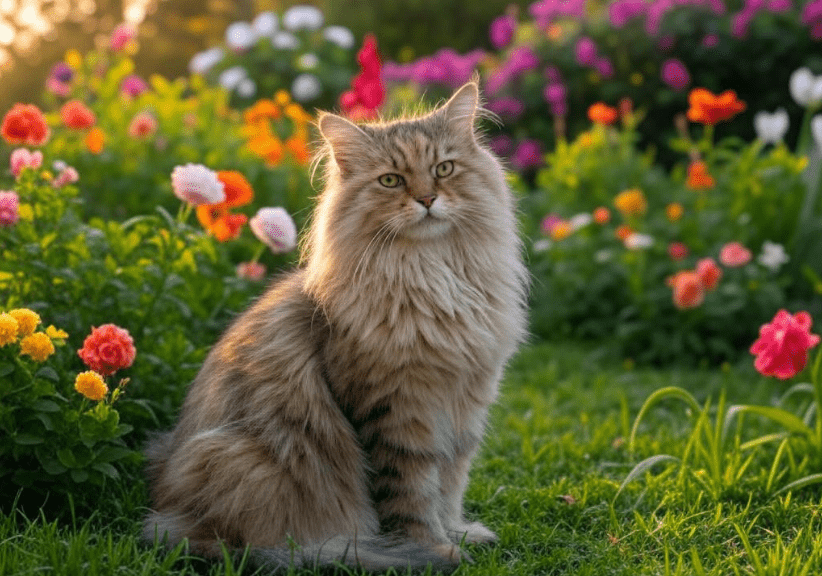
Managing Maine Coon stress is about understanding your cat’s unique needs and creating a supportive environment. By recognizing signs like hiding, over-grooming, or litter box issues, identifying triggers, and implementing strategies like enrichment, calming aids, and routine, you can help your Maine Coon feel secure and relaxed. Prioritize their health, strengthen your bond, and seek professional help when needed to address persistent stress. With patience and care, you’ll foster a stress-free life for your majestic Maine Coon, ensuring they remain the happy, playful companion you adore. Start observing your cat today and take the first step toward a calmer, healthier feline friend.

